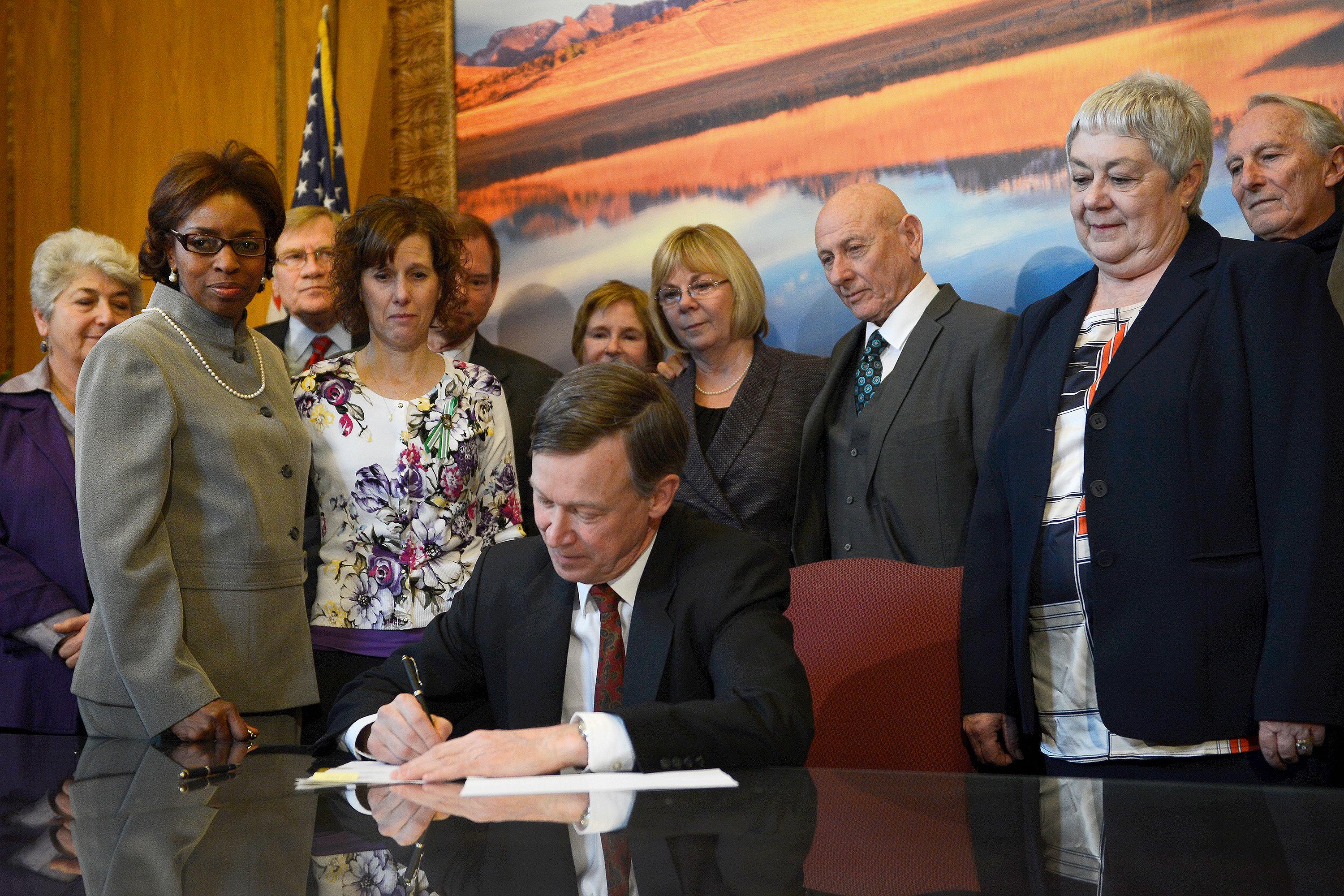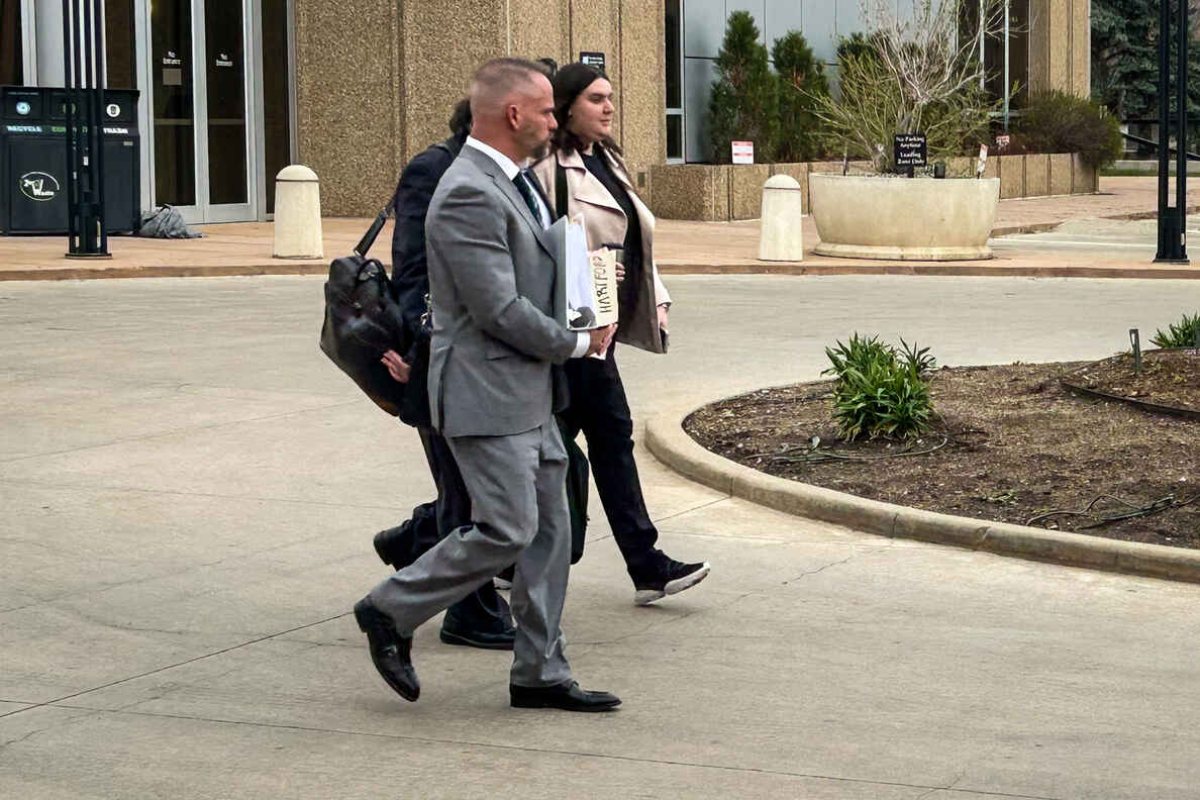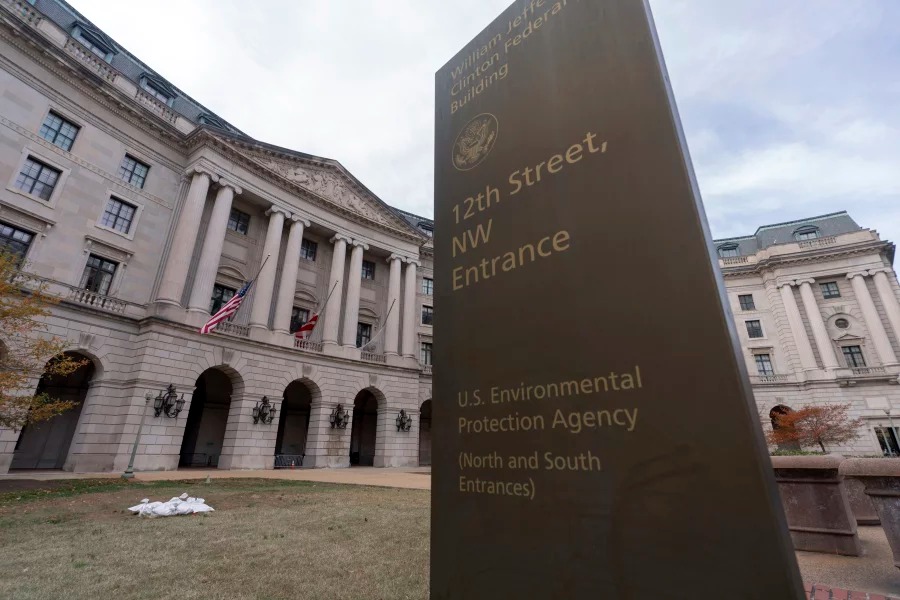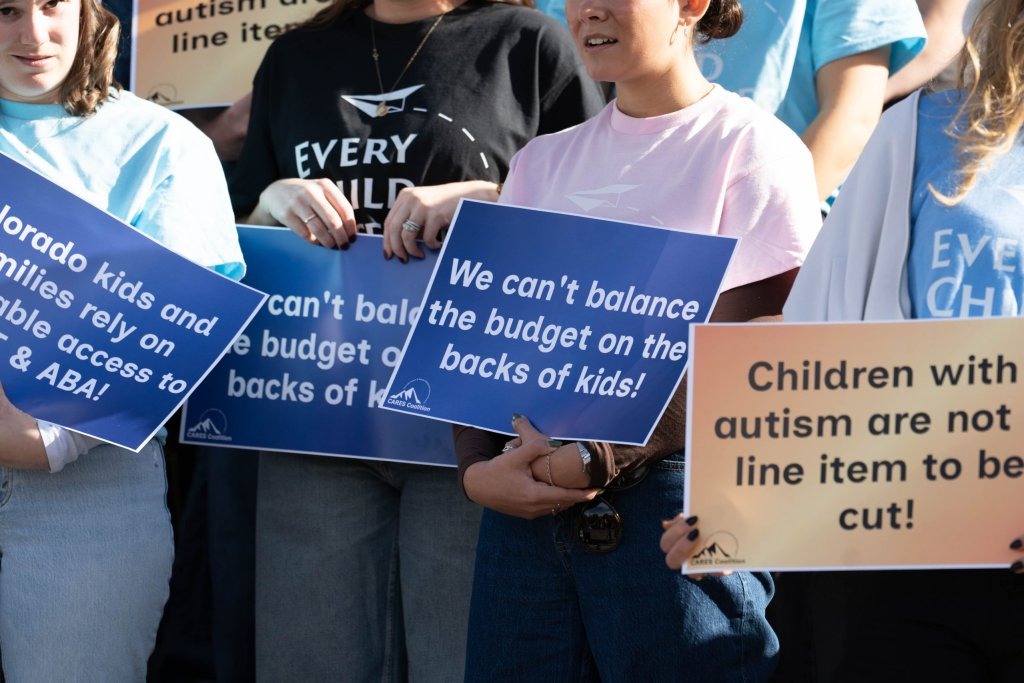

Back on March 20, 2013, Gov. John Hickenlooper took a seat inside his Colorado Capitol office as he prepared to sign some of the most contentious bills of his time in office. A large picture of a rural mountain landscape covered the wall behind him. Democratic lawmakers and families of gun violence victims crowded around him.
Applause erupted as he put pen to paper on a package of gun restriction measures — a ban on large capacity magazines and private sale background checks — that came to define his first term in office.
Among the witnesses that day was Jane Dougherty, a Colorado woman whose sister had been killed months earlier in the attack at Sandy Hook Elementary in Newtown, Connecticut. Next to her stood Sandy Phillips, whose daughter was killed in the Aurora theater shooting.
Hickenlooper, invoking the 2012 theater mass shooting, told the assembled witnesses: “We have signed today several bills that materially will make our state safer in the long-run and allow us to begin to address some of these issues head-on.”
Five years later, Hickenlooper’s time in office is almost up and there’s serious speculation about a presidential run. The Democrat has formed a political action committee and reportedly hired pollsters and national fundraisers. He’s made visits to important primary states like New Hampshire and Iowa.
During that October Iowa stop, Hickenlooper took a moment between speeches and meet and greets to reflect on his legacy as Colorado’s governor. Asked to name a moment when he took a stance, he pointed to the gun bills.
“We went for universal background checks and got it passed,” Hickenlooper said. “We went for small capacity magazines and we got that passed. Those are difficult issues in a state like Colorado. We took a stand.”
Those bills were a political liability for Democrats in a western state with a tradition of independence and gun ownership. Two lawmakers were ousted from office over the legislation. While Hickenlooper wasn’t the public face of the gun debate, how he conducted himself says a lot about Hickenlooper as a leader — as a governor — and as a potential United States president.
Two Shootings Spur Action
The seeds of that 2013 signing ceremony were sown in the early hours of July 20, 2012. That’s when James Holmes opened fire during the midnight showing of “The Dark Knight Rises.” Twelve people died and 70 others were injured.
Days after the tragedy, Hickenlooper was asked on national TV whether it was time to discuss changes to Colorado’s gun laws. At that point, the issue wasn’t on the table for him. He focused instead on his role as mourner-in-chief, meeting with victims and discussing ways to improve the mental health system. He appeared to dismiss the idea that different gun laws could have prevented the attack.
“This guy was diabolical,” He told ABC’s George Stephanopoulos. “He would have found explosives, he would have found something else, some sort of poisonous gas, he would have found something else to create this horror.”
Behind the scenes however, others were taking steps. Grassroots gun control advocacy group Colorado Ceasefire crafted proposals it hoped to see introduced in the next legislative session. It wasn’t until after the November election, when Democrats flipped the House to take full control of the legislature, that gun control actually had a chance in Colorado.
In mid-December, more than a month after the election, Hickenlooper reversed course and said “the time was right” to discuss gun laws.
The governor told the Associated Press he’d waited because he “wanted to have at least a couple of months off after the shooting in Aurora to let people process and grieve and get a little space.” While the governor didn’t offer specifics, the statement garnered attention because it was the firmest thing he’d said on the topic.
One day after Hickenlooper’s remark appeared the Sandy Hook massacre happened.
Even though the killing of 27 elementary students and teachers occurred on the other side of the country, Democratic leaders in Colorado said the event galvanized them to take action. That following January, when lawmakers returned to the capitol to work, gun control was one of the highest profile items on their agenda.
Road To The Governor’s Desk
Despite Hickenlooper’s remarks to the AP, his actual views were still a mystery; people waited to see if the governor would embrace his party’s ideas on gun control — or try to tack to the middle, like he has done on many issues. The answer came in Hickenlooper’s state of the state address.
He admitted there were “no easy solutions” but said the state’s record of addressing problems should lead to action.
“We shouldn’t be restrained from discussing any of these issues,” Hickenlooper said in 2013. “Our democracy demands this type of debate. Let me prime the pump: Why not have universal background checks for all gun sales?”
That line was big for Democrats. They gave him a standing ovation while Republicans sat on their hands. However, when state Democrats unveiled a package of measures the following month they turned to stronger language. They promised to ban “weapons of war” and end the “plague of deadly destruction.”
Democratic Rep. Rhonda Fields of Aurora, a bill sponsor who had also lost her son to gun violence, saw the difficulty ahead but said it was a “fight we can and we will win.”
“I pledge to the family members that are behind me that I will not rest,” she said. “I will not rest, until this is done. Because I’m here to tell you know that enough is enough and the time is now.”
Fields’ remarks to unveil the gun control legislation came as she stood behind a podium in the state Capitol’s open foyer. Hickenlooper wasn’t there, which wasn’t unusual for him; throughout his time in office, he generally avoided weighing in on controversial topics before they moved through the legislature. Hickenlooper often said to the capitol press corps he didn’t want to micromanage lawmakers. They should be allowed to do their job without him in the way.
But behind the scenes he was talking to lawmakers.
Former Democratic Speaker of the House Mark Ferrandino said lawmakers “didn’t want to get to a place where we were voting on bills the he wasn’t going to sign.” They continually sought Hickenlooper’s opinion when compromises were on the table.
“One of the criticisms sometimes of the governor was he wasn’t engaged on a lot of policy areas,” Ferrandino said, reflecting back on that time. “But I will tell you on the consequential ones, he would offer his opinion.”
Republicans also met frequently with the governor, even though Democrats didn’t need GOP votes to get the bills through. The Senate Republican’s Chief of Staff at the time, Jesse Mallory, appreciated “the fact that [Hickenlooper] would try to bring people across, but a lot of times it just didn’t work.” Overall, Mallory said he likes Hickenlooper, he thinks he’s funny, but thinks he tries to please everyone, an impulse that can backfire.
“I think people really want someone who’s going to make a decision right or wrong and pursue a path and not do this kind of well, gosh, shucks, maybe, we’ll bring some people together,” he said.

The governor didn’t say much publicly about the gun proposals as the fight raged at the capitol. When he did, it was in the way that he talks about so many controversial issues: he’s more comfortable giving arguments on both sides rather than picking one position and advocating for it. That was especially true for the high capacity magazine ban.
“We haven’t taken a specific position on that bill yet. But I, from time to time have said contradictory things about it. Right? It’s a tough issue,” Hickenlooper told CPR News after the bills had cleared their first chamber. “How many lives do you save? And how real is the inconvenience to people that want to have a larger capacity magazine and feel it’s essential for defending their house?”
Aftermath
Hickenlooper eventually took a position; he signed the bills. At that point he couldn’t run away from the proposals, but he didn’t leap to take credit or a victory lap. In fact, the opposite occurred. A few months later, tape showed up of Hickenlooper speaking to a group of Colorado Sheriffs. Recorded without his knowledge, it caught him apologizing for not being more open and collaborative. He also said he didn’t know how controversial the high capacity magazine ban would be.
“A lot of people, if they’d known how much commotion was going to come out of the high capacity magazines, probably would have looked for something different or a different approach,” Hickenlooper said on tape.
The governor also told the sheriffs he was essentially backed into a corner to sign the measure.
“One of my staff made a commitment that we would sign it if it got passed,” he said. “To be honest, no one in our office thought it would get through the legislature.”
The admission angered many as several Democrats faced recall elections connected to the bills. Jobs were on the line.
Gun control lobbyist Ann Marie Jensen said Hickenlooper has had courage on budget priorities like mental health and homelessness, but not in other cultural areas like #MeToo or guns. With the sheriffs tape, the mixed messages and the intimation that he wasn’t consulted disappointed her. For her, public officials are standard bearers that “help us to see things differently, and I don’t think Hickenlooper liked doing that.”
Many of Hickenlooper’s supporters were clearly baffled by the apology and it didn’t make anyone in the opposition any happier about the new laws. Today, Hickenlooper speaks about the measures differently. The current political climate isn’t the same as 2013. Then he was a year away from a reelection fight for the governorship. In 2018, he’s contemplating a run for the White House. The furor over those laws has died down in Colorado, and Hickenlooper’s signature on gun control is probably an advantage in a national Democratic primary.
A Bridge To Everyone
Across the political spectrum, everyone we asked about the governor agreed that he listens, that he seeks compromise. His impulse is to always get people in a room to hash things out. It’s an approach that can frustrate the people he’s working with though.
“Sure, the legislature doesn’t want to be told what to do. But I think that’s different than the legislature being led where I think they need to go,” said Mark Waller, the Republican House leader during the gun debate. Even thought Waller opposed the bills, he always wanted the governor to be more out front on the issue, own up to gun control and stand behind why he signed them. He said sometimes a governor needs to have a vision, even if that makes some upset.
“I think that’s an excuse that if he made a decision that’s injecting politics into it,” Waller said. “You know what? Leaders figure out how to take people where they want to, even when they don’t necessarily know that’s where they want to go.”
Others say Hickenlooper’s cautious style can really work. Former Senate President John Morse, a Democrat who was recalled over the gun bills, said Hickenlooper is thoughtful and nuanced, just what the country needs.
“John Hickenlooper’s greatest strength is his absolute commitment to bring people from every viewpoint together to try to address a problem. He doesn’t take the, ‘OK, the answer is X. So, I need to find a bunch of people that think X, so that I can get X done.’” Instead, Morse said that while the governor’s gut might suggest an answer, he’s willing to ignore it, gather the best people he can and keep his options open.
“That’s John Hickenlooper,” Morse said.
It can be tough when Hickenlooper doesn’t move as fast as people want. But if you ask Morse, what matters is that the gun bills he backed and signed are still the law in Colorado. Lawmakers were recalled, but all attempts to alter or pare back the measures have been turned aside.
If Hickenlooper does run for president, voters won’t get a partisan firebrand who likes to be the face of an issue. Both supporters and critics say he’s not interested in scoring political points in a debate or making his opposition look bad — this is afterall, the candidate who is famous for his squeaky clean campaign ads and for criticism of the candidates who attacked each other in the race to succeed him. Hickenlooper won’t cut off dialogue with those he disagrees with.
To that end, he’s not likely to lead the charge in the culture wars or other divisive issues of the day. He’s not a bomb thrower. For good or ill, Hickenlooper, once described as the opposite of Trump, is too much of a consensus builder for that.








